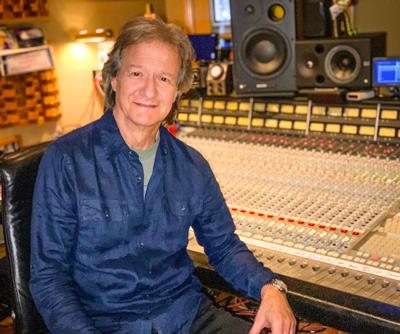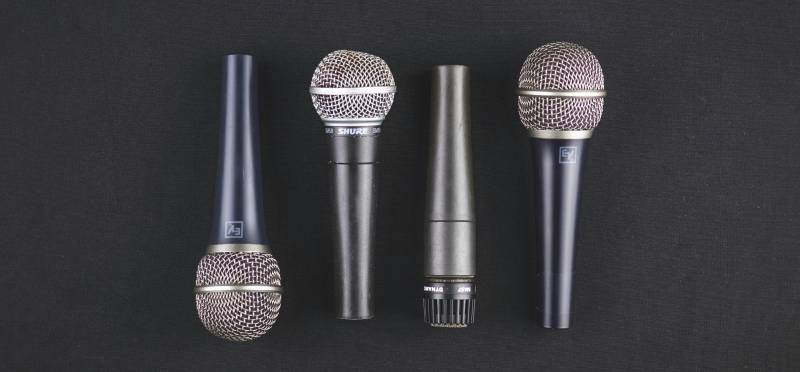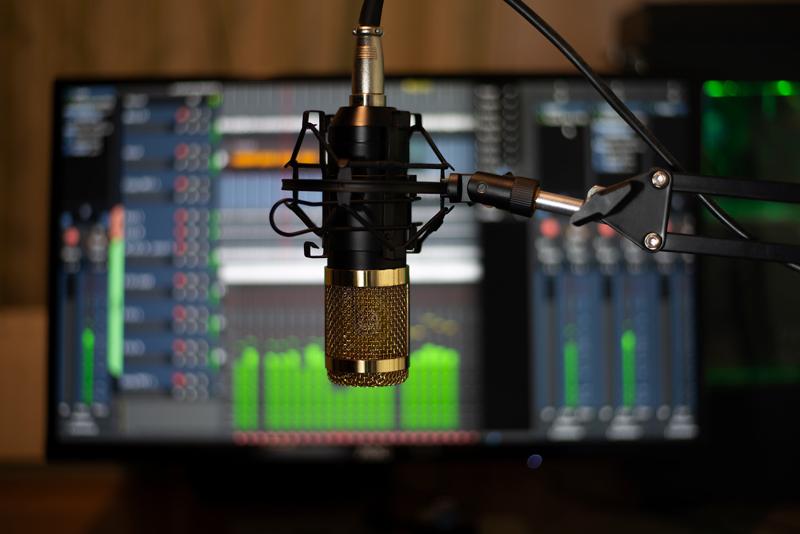Do mixing and mastering engineers get royalties? The short answer is: Most mixing and mastering engineers don’t receive any share in the song’s revenue. However, in some cases, a mixing engineer might get 1 point, which means they will be able to collect 1% of master royalties. At the same time, mastering engineers usually don’t receive any right for royalties.
Now let’s look deeper at the song production process, and the types of copyright in which the audio engineer can get a share, and hence be entitled to collecting royalties.
Types of copyright
There are many different types of royalties related to songs, their distribution and performance. However, it all comes down to two types of rights musicians need to reserve when a song is created. It’s a copyright for the music and lyrics, and a copyright for the master record.
Songwriter’s copyright
 These rights are related to the creation of a song. They include obtaining copyright for lyrics, melody, and other significant parts of the song. The listed co-creators get shares in the corresponding royalties.
These rights are related to the creation of a song. They include obtaining copyright for lyrics, melody, and other significant parts of the song. The listed co-creators get shares in the corresponding royalties.
Whenever the song is performed, streamed, or used in any way, this copyright generates royalties.
The royalties related to Songwriter’s copyright are called Songwriting royalties or Publishing royalties because these same royalties can be divided between the songwriter and their publisher. Sometimes, however, independent songwriters perform the role of the publisher for their songs themselves.
Splitting their copyright with a publisher gives the songwriters some benefits because the publisher will then use their resources to find the artist to perform the song, make it popular, and generate good revenue. A part of it will be paid to the people who cooperated in writing the song, and a part will remain with the publisher.
Master copyright
 Master copyright or Sound recording copyright is registered for the master record of a song. The corresponding royalties are called Master royalties or Artist’s royalties.
Master copyright or Sound recording copyright is registered for the master record of a song. The corresponding royalties are called Master royalties or Artist’s royalties.
As you see, the rights to a master record are reserved separately from the rights for the song itself. This is done because firstly, you can make several master records of one song, and secondly, you can make a cover version of a song. In this case, you’ll receive royalties only for the recording, not the author’s royalties.
Copyright for the recording can be owned by a label, recording studio, or artist.
Types of royalties
A song can generate royalties for you in many different ways. If you have a part in the copyright, you should get paid when your music is used on streaming platforms, radio or TV, in bars and clubs, at concerts, for videos and in movies, and others. You also receive royalties when your music is printed, sold, or downloaded.
Therefore there exist different types of royalties. We already have talked about Songwriting and Master royalties, which were the types of royalties regarding songwriting and recording copyrights. But now, let’s look through the main types of royalties regarding different ways of using and distributing songs.
Mechanical royalties
Mechanical royalties are generated when your music is reproduced. The name Mechanical goes back to the times when the master copy of a song was placed on a physical medium like a tape, vinyl, or a disc.
Nowadays mechanical royalties cover digital streaming as well as selling copies of songs both digital and on physical mediums.
Performance royalties
Performance royalties are created when a song is performed. Hence performances differ, there are several types of these royalties, such as traditional performance royalties, digital performance royalties, performance on radio, etc.
Synchronization royalties
Synchronization royalties (or Sync royalties) are earned when a song is licensed to use in a video, a movie, or with similar media.
Print royalties
Print royalties or Printed music royalties are produced from the distribution of copyrighted sheet music.
Royalties generated on streaming platforms
 As you see, all the different ways of using songs are related to a bunch of different types of royalties. Moreover, one usage of a song may generate two or more types of royalties, which can be collected for you by different organizations where you need to be registered.
As you see, all the different ways of using songs are related to a bunch of different types of royalties. Moreover, one usage of a song may generate two or more types of royalties, which can be collected for you by different organizations where you need to be registered.
Playing your music on streaming services like Spotify will create for you Performance royalties and Mechanical royalties because digital streaming is considered both a performance for people and a reproduction of a song. These royalties include both Songwriter’s royalties and Master royalties.
How to obtain the rights and collect all of the royalties a song generates for you is a big topic for another article. Now, as we have looked through the types of copyrights and royalties, let us talk about what share and in which royalties can a mixing engineer try to receive.
What royalty rate do mixing engineers get?
Mixing engineers don’t usually get royalties for mixing. They are paid a flat rate or paid by the hour but don’t receive any ownership of the recording they mix.
However, some mixing engineers may ask for royalties for mixing a song. Of course, the more famous and professional the engineer is, the bigger the chance he or she will be able to get a share in the copyright of the final recording.
Want a free test mix of your track?
We get it.
That’s why we’ll do a full hybrid (analog + digital) mix of your song —
for free.
No upfront payment. No risk.
You only pay if you’re blown away. And if you are, we’ll slash 40% off the final price.
Nobody else in mixing and mastering offers this.
Why?
Because most studios say yes to every project. We don’t. We only mix what we’re excited about — so send us your best track. If we like it, we’ll mix it like it’s going to the Grammys.
👉 Just drop your name and email to get started.
If a mixing engineer wants to obtain royalties for mixing, it’s usually a 1% share (or as it is called “1 point”) in the Master royalties. These are the royalties related to owning the copyright for the recording.
What royalty rate do mastering engineers get?
Compared to mixing, mastering is a less creative process, and it doesn’t so much affect the shape of the music piece as mixing does.
Therefore, unfortunately, mastering engineers don’t usually get any royalties solely for mastering music.
Is it worth it to go after royalties for mixing?
 As we said, mixing engineers often receive only a fee for their work. Wouldn’t royalties be a more profitable passive income? Well, oftentimes they would not. Remember, the royalties for mixing is usually only 1%. And if the song does not become really popular, the mixing fee will even be greater than this share of royalties.
As we said, mixing engineers often receive only a fee for their work. Wouldn’t royalties be a more profitable passive income? Well, oftentimes they would not. Remember, the royalties for mixing is usually only 1%. And if the song does not become really popular, the mixing fee will even be greater than this share of royalties.
Historically, the famous mixing engineer who is said to be the first to ask for royalty for mixing is Bob Clairmountain. He understood that the songs obtained a distinctive sound and shape thanks to his work, and so he wanted to be acknowledged as a creative participant.
Bob Clairmountain has mixed songs for legends like The Rolling Stones and David Bowie, and has worked a lot with Brian Adams.
Of course, if you are mixing a future super popular hit or a song for a celebrity, you will definitely benefit from getting your point in recording copyright.
How a mixing engineer can receive more royalties
If a person is getting royalties for a song, no matter Songwriting or Master royalties, it must indicate that he or she has made a significant contribution to the creation of the song.
Do more creative work
If you want more, walk the extra mile if you would. With mixing, you may also participate in arrangement improvement, add some elements to the music, and suggest changes. If the artist feels you contributed something substantial even besides mixing, you’ll have more chances to negotiate royalty points for the master record.
Of course, if you are taking other roles in the production of a song besides mixing, then you may be entitled to more points. If you are also a producer, for example, you may get the usual producer’s share in master royalties, which is 3% (3 points).
Highlight your input
However, if you are only mixing a song and doing nothing else in this song’s production process, you still are contributing a lot. Mixing shapes the sound, creates the needed depth and width of the music, and establishes how all the sound parameters change throughout the song. This itself is a huge creative work, but it may not be well noticed and appreciated by the artist.
If a mixing engineer wishes to negotiate royalties, they must be able to describe and explain their contribution to the creation of the master record. After all, even the best song cannot become a hit without excellent professional mixing.
You’ll get more with time
As the experience of a mixing engineer grows, and the portfolio of their works contains more and more popular songs, or maybe they get a chance to collaborate with some famous artists, producers, and labels, their chance to get royalty points for their work increases.
Want a free test mix of your track?
We get it.
That’s why we’ll do a full hybrid (analog + digital) mix of your song —
for free.
No upfront payment. No risk.
You only pay if you’re blown away. And if you are, we’ll slash 40% off the final price.
Nobody else in mixing and mastering offers this.
Why?
Because most studios say yes to every project. We don’t. We only mix what we’re excited about — so send us your best track. If we like it, we’ll mix it like it’s going to the Grammys.
👉 Just drop your name and email to get started.
Conclusion
So, to recap what has been said. You are a mixing engineer and thinking about asking for royalties.
First what you need to evaluate is if the royalty is worth it. Because if the song in question is going to become just another unknown upload among millions of others, you’ll not get anything substantial from your 1% master rights anyways.
If the song is the hit material, you may consider negotiating royalties, and then the standard share is 1% master rights for your mixing.
If you have contributed to the song creation in other ways in addition to mixing, you may ask for a bigger share in master rights, or if you have participated in the creation of the lyrics or melody, you may get your share in the song’s copyright.
Anyways, keep up your creative work, and if you haven’t yet, we wish you one day to take part in the production of a super-hit that everyone will listen to, and to get your share in that song’s royalties.
By the way, if you need help in song production, check out our mixing and mastering services. Look through our services and contact us, we’ll be happy to help you boost your career!










